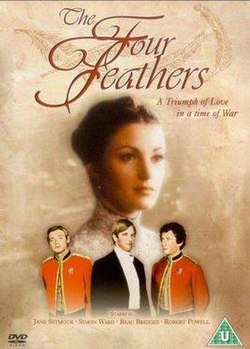The Four Feathers (1977 film)
| The Four Feathers | |
|---|---|

DVD cover
|
|
| Genre | Adventure Drama Romance War |
| Based on |
The Four Feathers 1902 novel by A. E. W. Mason |
| Written by | Gerald Di Pego |
| Directed by | Don Sharp |
| Starring |
Beau Bridges Jane Seymour Robert Powell Simon Ward Harry Andrews |
| Music by | Allyn Ferguson |
| Country of origin | United Kingdom |
| Original language(s) | English |
| Production | |
| Executive producer(s) | Robert D. Cardona |
| Producer(s) |
Norman Rosemont Bruce Sharman (associate producer) |
| Location(s) |
Wiltshire, England Hampshire, England Almeria, Spain |
| Cinematography | John Coquillon |
| Editor(s) | Eric Boyd-Perkins |
| Running time | 100 minutes |
| Production company(s) | Norman Rosemont Productions Trident Films |
| Distributor | NBC |
| Release | |
| Original network | NBC |
| Original release | January 1, 1978 |
The Four Feathers is a 1977 British television film adaptation of the classic novel The Four Feathers by novelist A.E.W. Mason. Directed by Don Sharp, this version starred Beau Bridges, Robert Powell, Simon Ward and Jane Seymour, and was nominated for a Primetime Emmy Award. It follows the novel almost exactly, and response to the film was very positive.
Lieutenant Harry Faversham (Beau Bridges) is the latest scion of a prominent military family. A deeply sensitive boy, he is much traumatised by the early death of his kind-hearted mother. Though he never wants to be a soldier, he feels obliged to join the army. Though no coward (as he will later show), he has no interest in an army career. Having met and become engaged to Ethne, he decides to resign his commission. The fact that war in the Sudan is coming is irrelevant to this decision. During their engagement ball on the final day of his army career, Faversham receives telegrammes summoning him and three of his brother officers (Durrance, Willoughby and Trench) back to the regiment prior to being sent to the Sudan. As determined as ever to leave the army, Faversham burns the telegrammes so that he can pretend not to have been summoned back to the regiment before his commission expires. Willoughby sees him burning papers and notices that he is embarrassed to have been taken by surprise in doing so. On later realising that Faversham was burning the telegrammes from the army, Willoughby assumes that Faversham has done so because he is afraid of going to the Sudan. Durrance, Willoughby and Trench then send Faversham three white feathers, betokening cowardice, and turn their backs on him. When Faversham tries to explain to Eithne what has happened, she also reaches the same mistaken conclusion and gives him a fourth white feather. Following his regiment's deployment, Faversham realizes he has made a grave mistake and, having toyed with suicide, finally resolves to redeem his honour.
Disguising himself as an Arab, Faversham makes his way to the Sudan determined to perform three acts of courage that will persuade each of his former comrades to take back their white feathers. find his unit. He learns of an impending attack on the regiment, and tries to make it in time to save them. During the battle, his closest friend Captain Jack Durrance (Powell) becomes engaged in close combat, during which he is blinded when a black-powder rifle goes off next to his face. Faversham attacks the Arabs who surround Durrance, and rescues him as he staggers blindly. In the end, Faversham is able to help his regiment, and redeem his honour.
...
Wikipedia
